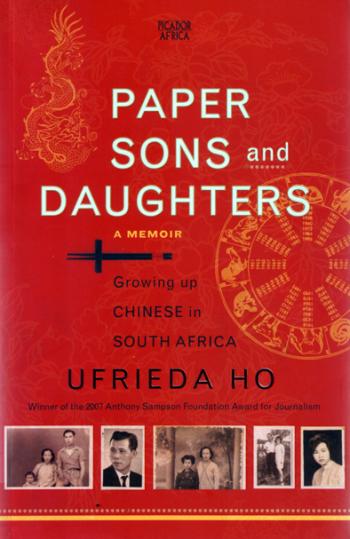Posted on July 26, 2011

The book begins by recounting how Ho's grandfather came to South Africa in the 1950s, hiding as a stowaway on a ship crossing the Indian Ocean, in the hopes that Johannesburg would offer a better quality of life and better opportunities than his home in Communist China. The title of the book refers to what he became in South Africa - a "paper son" who borrows or buys a new identity from more established Chinese families in order to avoid detection and deportation by immigration authorities.
Apart from being considered a second-class citizen and the "geel gevaar", Ho Sing Kee cannot live where he chooses, is denied jobs that are reserved for whites, and he has to change his name to something that is easier for officials to spell correctly. What we take for granted as 'normal', Ho consistently highlights as strange for immigrants from a different background. She uses an anecdote about her dentist's receptionist asking her for her mother's birth date to illustrate the point: "I thought about trying to explain the confusion of paper sons and daughters and lunar calendar fickleness next to the steady Gregorian one. I imagined her tapping a pencil, twirling her hair and being sceptical of a daughter who did not know her own mother's birthday. I shut up and owned up to the shame with my silence. I could not explain myself out of that situation in two or three sentences."
Issues of history and memory are addressed throughout the memoir, and it is interesting to read about how different the attitudes towards memory and record-keeping were in Ho's grandparents' village. Firstly, illiteracy meant that very few written records of history, birth and other important dates were kept. "Even oral histories conflicted and it just left more questions unanswered. In the villages people used to have many children because they knew several would die, and sometimes the young dead were ignored because there was no luxury in remembering for too long." How curious and daunting, then, for Ho's grandparents and parents to be transplanted into a society which documents everything and prizes the written record, without which one officially does not exist?
The importance of record is again highlighted when Ho describes a document that was folded up carefully and carried religiously by her father - a piece of paper stamped by the Chinese Consulate, deeming him to be a "gentleman of good standing" - to afford him protection. "The folds on that worn piece of paper were so deeply set they were like the mark left on a dog's neck when its too-tight collar is removed."
This was during the 1960s, when apartheid and its mentality were deeply entrenched in South Africa - however the treatment of Chinese immigrants and even South African-born Chinese did not necessarily improve with the coming of democracy. As recently as the late 1990s, Ho herself was the victim of xenophobic protests against Chinese presence in the country. "Go back to China!" they shouted at her. "They did not ask about whether I was paying tax to the current government or what my passport said about my nationality; all they could identify with was my skin colour," says Ho.
In an interview with The Citizen, Ho remarks, "I do think that we need more awareness about each other as South Africans in general. We need to be able to explore the subtleties, the context and the complexities that make up who we are as diverse communities who share this country. It's in wanting to understand through authentic, sincere exchange that we can move away from stereotypes, easy assumptions and prejudices."
Unusual records like Paper Sons and Daughters, which contains stories that are often overlooked in official archives, help us to begin this exchange. Explains Ho: "I've said of the book: a little bit of my story is yours and a little bit of yours is mine, and I really do believe that."
Rebecca Dodd is a free-lance journalist